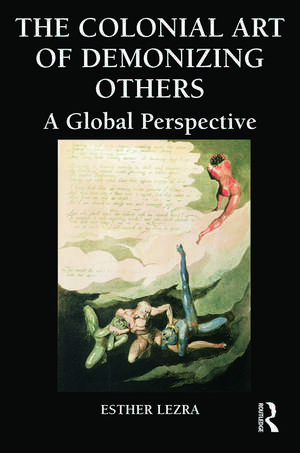The Colonial Art of Demonizing Others: A Global Perspective: Global Horizons
Autor Esther Lezraen Limba Engleză Hardback – 6 mar 2014
The Colonial Art of Demonizing Others privileges the political reading not only of literary texts but also of historical documents and visual culture.
Preț: 698.80 lei
Preț vechi: 822.11 lei
-15% Nou
Puncte Express: 1048
Preț estimativ în valută:
133.74€ • 139.09$ • 111.92£
133.74€ • 139.09$ • 111.92£
Carte tipărită la comandă
Livrare economică 15-29 martie
Preluare comenzi: 021 569.72.76
Specificații
ISBN-13: 9780415742269
ISBN-10: 0415742269
Pagini: 168
Ilustrații: 20
Dimensiuni: 156 x 234 x 18 mm
Greutate: 0.47 kg
Ediția:1
Editura: Taylor & Francis
Colecția Routledge
Seria Global Horizons
Locul publicării:Oxford, United Kingdom
ISBN-10: 0415742269
Pagini: 168
Ilustrații: 20
Dimensiuni: 156 x 234 x 18 mm
Greutate: 0.47 kg
Ediția:1
Editura: Taylor & Francis
Colecția Routledge
Seria Global Horizons
Locul publicării:Oxford, United Kingdom
Public țintă
Postgraduate and UndergraduateCuprins
Introduction, Chapter 1. Transfigurations and Mistranslations of Black Freedom Culture in Narratives of the Colonial Era, Chapter 2. Jean François, the Spanish Constitutional Debates and the Monkey of Seville, Chapter 3. Solitude: Translating the Abject into Agent, Chapter 4. The Task of Transfiguration, Conclusion
Descriere
The Colonial Art of Demonizing Others examines European mistranslations and misrepresentations of black freedom dreams and self-activity as monstrous in the period of modern imperial consolidation –roughly from 1750 to 1848.
This book argues that Europe’s archives of self-understanding are haunted by the traces of Black radical resistance. Just as Europe’s economy came to depend upon the raw materials, markets, and labor it secured from the colonies, European culture came to be based on fantasies and phobias derived from the unruly and unmanageable aftershocks of colonial violence and counter-insurgency. Rather than assert that European nationalist and abolitionist discourses are on the side of emancipatory movements, the book shows the limits of the promise of that discourse, and the continuation of those limitations that makes the continued pursuit of that promise a questionable activity. This book does not wish to salvage the emancipatory promises of European discourse, but considers the more difficult and uncomfortable question of why emancipatory movements represented the struggles of anticolonial and radical blackness the way they did.
The Colonial Art of Demonizing Others privileges the political reading not only of literary texts but also of historical documents and visual culture.
The Colonial Art of Demonizing Others privileges the political reading not only of literary texts but also of historical documents and visual culture.


























